he immediately acquired high honors among the astronomers of this country by means of a number of important improvements in astronomical instruments which he constructed and invented at Washington, D. C. These instruments went to various observatories, such as the United States Naval Observatory, etc., and were awarded diplomas by the Chicago Exposition and a gold medal at the exposition of Paris in 1900. Many professional men send unsolicited testimonials of their appreciation from all over the world. It requires a scientific treatise to appreciate the work of Pecker during his stay at Washington. For the observatory at Georgetown alone he constructed the new photo-chronograph, a new photographic transit and zenith-telescope, etc., which is known in the recent German astronomic books as "Constructeur G. N. Saegmueller." In Cleveland he found the desired opportunity to fully develop his abilities. There he gloriously solved the difficult problem through a new method of finishing the best automatic machine for the division of the fine circles, which standard dividing, when tested by Professor Morley, proved such exactness in its work that it excelled all other machines in this line by more than fifty per cent. This invention enhanced the reputation of the firm, and there is now no observatory in the United States which is not in possession of astronomic instruments that have not passed through the hands of Master Fecker, whose great skill has succeeded in giving to the astronomers the finest tools for measuring all spherical distances. Recently Fecker occupied himself with the poro-prismatic telescopes. He constructed for them new adjusting apparatus, which are the best of their kind known. But all these accomplishments of late date are by far not so important as the invention he made on behalf of the United States Government for his firm of the new range-finder which renders it possible by our artillery to determine the position of a man-of-war on the waters from our forts, with such a precision that our disappearing rapid-firing guns are enabled to accurately strike them with their shells at a distance of twelve thousand yards. Our naval officers are so enthusiastic about the excellency of this new range-finder that the Warner & Swasey Company has every reason to be particularly proud of the guiding genius from whose fertile brain this wonderful invention has emanated. It goes without saying that Fecker is a most manysided man of profound knowledge, and fully deserves the high honors which make him a truly progressive representative, not only of Ohio, but of our whole glorious country. Mr. Fecker is married and the father of a talented son, who will most certainly follow the footsteps of his famous father should Providence permit him to live.
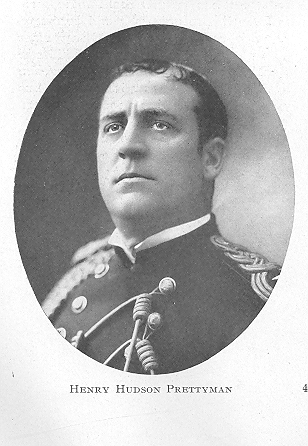
Henry Hudson Prettyman, Of London, Ohio, one of the representative business men of the State, was born in Milford, Kent County, State of Delaware, on the 27th of September, 1854, coming of a long line of English ancestry, whose first American representatives settled in Delaware, in 1692. His father, Dr. John S. Prettyman, was a physician of prominence in that State. Colonel Prettyman received part of his education in Europe,
- 450 -
afterward finishing his literary training in this country. He purchased the old Republican newspaper, "The News and Advertiser," in Delaware, and edited the same for several years. Upon leaving his native State in 1880, he became a resident of New York City, where he remained for several years, going thence to London, England, where he was identified with large business interests. In 1877, Colonel Prettyman was married to the daughter of Major Peter Buffenburg, of Ohio. He settled in Madison County, this State, in 1892, and has since been one of the most enterprising and foremost citizens of that county. Energetic and forceful in character, and an enthusiastic Republican, he has on his merit won a position among the leaders of the Republican party of Ohio. His large experience in the business world, wide acquaintance with prominent men of affairs, both in the United States and Europe, has made him a man of pronounced liberal views, and given him the power of keen discernment and prompt action. Notwithstanding the active interest which Colonel Prettyman has always evidenced in public affairs of Ohio, he has never held any elective office, or a lucrative appointment, steadfastly refusing to accept same although many times tendered him. After the election of Governor Bushnell, Colonel Prettyman became a member of the Governor's staff, a purely honorary pcsition. He is manager of one of the largest farms, if not the largest, east of the Mississippi River, and personally supervises the operation of cultivating and marketing the products of 5,400 acres of productive land. Besides that, he has large corporate interests, and is a promoter of national and European reputation.
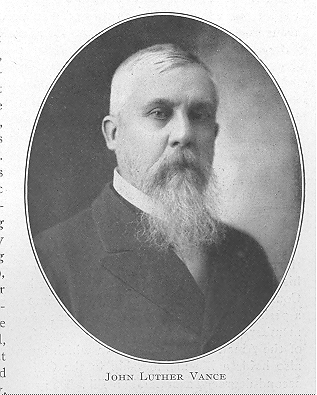
John Luther Vance, President of the Ohio Valley Improvement Association, is a man of national reputation, by reason of his aggressiveness in the movement of giving the Ohio River a permanent stage of at least nine feet of water. Mr. Vance is a native Ohioan, being born in Gallipolis, Gallia County, on the 19th of July, 1839. His parents were Alexander and Eliza A. Vance. Mr. Vance was educated in the public schools of his native town, and received an academic education in the Gallia Academy. At seventeen he taught in, the public schools adjoining Gallipolis, and one year later became Deputy Clerk of Courts of Gallia County. Entering the Cincinnati Law School in the fall of 186o, he took a course in law, and in the same year was appointed on the staff of General Constable, of the Ohio Militia. The day after he graduated from the Cincinnati Law School, in April, 1861, he was ordered to report at Gallipolis for military duty. He recruited and organized the first troops in Gallia County, and on the 3d of June, 1861, he began recruiting a three years' company. On the 5th of July, 1861, he joined the Union Army, with the rank of Captain in Company B of the Fourth Virginia Infantry. For meritorious and valorous service he was promoted on the 28th of April, 1862, to the position of Major, and on the 31st of May, in the same year, he became Lieutenant Colonel of the same regiment,
- 451 -
and was finally promoted to the command of his regiment. At Wheeling, W. Va., on the 11th of November, 1864, he was mustered out of service, after an honorable and distinguished career. During the war he participated in forty-seven (47) battles and minor engagements, among them the battles of Fayetteville, Cotton Hill, Loop Creek, Charleston ; also in the Vicksburg campaign, Raymond, Champion. Hills, the siege of Vicksburg, Jackson, Mission Ridge, Winchester, Lynchburg, the Shenandoah Valley campaign of 1864, and many other engagements. Five times he was wounded in battles, without serious effects, and one time, at Vicksburg, was very severely wounded. After his retirement from the army, Colonel Vance engaged in the steamboat business, and was blown up on the steamer "Cottage" on the Kanawha River. He was seriously injured by the explosion, but recovered without permanent injury. In 1867 he began the publication of the Gallipolis "Bulletin," in which he continued his interests until 1900, when he sold out. During his active career as a steamboat man, he saw the dire necessity of improving the great waterways of the Ohio Valley, and in 1895 assisted in the organization of the Ohio Valley Improvement Association, by which he was honored with the position. of President of that body. Through his untiring efforts he secured appropriations from the National Congress for the building of a number of important dams on the upper Ohio River, and his influence has been so marked that the scheme of increasing the depth of the Ohio to a nine-foot stage, has been agitated in the halls of Congress, and there is every reason to believe that the work will 'be accomplished. Colonel Vance still occupies his position as President in that organization, having been re-elected ever since it was formed. In political belief, Colonel Vance has always been a Democrat. In 1865, he was nominated for Representative and four years later as State Senator, but both of these times he was defeated. In 1874 he was elected a member of Congress from the Eleventh Ohio District, serving one term. He received the nomination for the same position in 1876, and again in 1884, but was defeated on both occasions, the district being heavily Republican. In 1872 Colonel Vance was a delegate to the Democratic National Convention, and has been a delegate to many State conventions, as well as a member of State Central and Executive Committees of his party. Governor Campbell appointed him Quartermaster General and Commissary General of Ohio in 1889. In the same year he began the agitation for erecting a hospital for epileptics, secured the passage of a bill in the Legislature, favoring the project, and was appointed a member of the commission to select a site and have plans prepared. He was President of the commission, and the hospital was located at Gallipolis, the first of its kind in the world. Colonel Vance has always been a.public spirited man, and has taken an active part in all matters pertaining to the public welfare. His sympathies are broad and his nature kindly. Combined with this, he has a force of- character which can not be dominated by any influence contrary to his idea of the right. For many years he has been a member of the Cincinnati Chamber of Commerce, and was honored by unanimous election as a life member of that body, and for a period of twelve years was President of the Gallipolis Board of Trade. He is a prominent member of the G. A. R. and the Loyal Legion.; a member of the Ohio Society of the Sons of the American Revolution, in which body he occupied the chair during 1891 and 1892. He also holds a life membership in the Ohio Archaeological and Historical Society, is a thirty-second-degree Mason, and an Elk. He has been a trustee of the Rio Grande College for many years, and,-in 1896, he was appointed by Governor Bushnell a trustee of the Boys' Industrial School of Ohio, to which position he was reappointed by Governor Nash, and, later, again reappointed by Governor Herrick. Mr. Vance was married on the 4th of October, 1866, to Miss Emily Shepard, his first cousin, and on her mother's side a descendant of an old French family, which settled at Gallipolis in 1817. By this union Colonel Vance is the father of three sons.
- 452 -
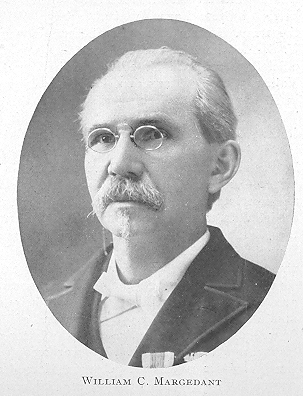
William C. Margedant, Deceased, one of the men by whose energy the city of Hamilton, Ohio, has become an industrial center, was born on the 15th of November, 1835, in the city of Duesseldorf, Rhenish-Prussia. His father was a German railroad officer, who carefully educated the son in the public schools of Duesseldorf, as well as in the Polytechnical and Technical Schools of that city. He then attended the Academy of Fine Arts and Paintings, and subsequently received practical mechanical instructions in the shops of the railroad company, where his father was an officer. Emigrating to America in 1854, lie arrived in Cincinnati, and found employment with C. A. Latta, assisting in building the first fire engine made in this country. Later he went to Hamilton, and after working in the shop of Owens, Lane & Dyer, he became associated with the Bentel & Margedant Company, designers and manufacturers of woodworking machinery. This company is still in existence, carrying on a large and lucrative business under the same name, and has gained an international reputation. For many years. Mr. Margedant was President of that company, and largely to his ability can be ascribed the tremendous success of the concern. Captain Margedant was a very public spirited man, and took a very active interest in all movements for the development of the city of his adoption. For a number of years he was physical instructor and speaker of the Hamilton Gymnastic Society, as well as President of the United German Societies. He was a member of the Board of School Examiners and President of the Citizens' War Committee in 1898. He was organizer of the Centennial celebration in 1876, the Hamilton Centennial in 1891, and the Columbus celebration in 1892, as well as the Electric Light Celebration in 1895. During the Columbian Exposition he was President of the Executive Board of Judges of Award, also President of the Pioneers', Soldiers' and Sailors' Permanent Monument Association of Hamilton, and President of Mercy Hospital from its founding until the time of his death. Captain Margedant has an enviable record as a soldier. On the first call of President Lincoln for 75,000 men on the 15th of April, 1861, he organized on that day a company of forty-eight volunteers, most of whom were members of a gymnastic association of Hamilton. They were all drilled in the manual of arms, that being -part of their exercises: In the evening of the same day W. C. Margedant and his company left for Cincinnati to join the Ninth Regiment, O. V. I., which was largely composed of well-trained athletes. The original organization of the regiment consisted of two thousand privates, besides officers, each company mustering two hundred men. The election of officers took place on the 16th of April, one day after. W. C. Margedant was elected Captain on the first ballot, receiving 197 votes. Upon his refusal to accept any official rank, he was again elected a second and a third time, with an addition of one
- 453 -
vote on each ballot, when he accepted the Captaincy. The regiment soon afterward left for the front at Philippi, West Virginia, and Captain Margedant remained in the service until the expiration of the three months for which he had originally enlisted. Refusing promotion in the regiment, he was appointed topographical engineer at Buchanan, West Virginia, on the staff of General W. S. Rosecrans, by the order of Major General George B. McClellan, commanding the Army of Western Virginia. Captain Margedant participated in. the first battles of the war, namely Philippi, Beverly, Camp Garnet, Rich Mountain, Carnifex Ferry, and in all the battles and skirmishes of Gault Ridge, Hawk's Nest, Sewell Mountain, Fayetteville, New River, etc. He organized and compiled for this region of Western Virginia the first detailed topographical maps, making surveys under great difficulties in the enemy's line. He also organized an army engineer service. General Rosecrans spoke most highly of Captain Margedant's services in his official report to President Lincoln of the battles of Rich Mountain and Carnif ex Ferry. Again Captain Margedant's name was prominently mentioned in the official report of Brigadier General Rosecrans after the battle of Cross Lanes, West Virginia. When General John C. Fremont took command of the army, Captain. Margedant became a member of his staff, acting for Colonel Reynolds, U. S. A., where he rendered valuable services. Brigadier Major R. C. Schenck, U. S. A., officially recognized his energy, activity and ability during the battles in the Shenandoah Valley. Captain Margedant later served on the staff of General Franz Siegel and took part in all the battles and engagements with the army of the Potomac. He again joined General W. S. Rosecrans at his request on the i ith of March, 1863, and took part in all the battles from Stone River to Chickamauga, and later in the siege of Chattanooga, Lookout Mountain and Missionary Ridge, as well as all the battles up to Atlanta, Georgia. For his services he was reported directly to President Lincoln by General Rosecrans, commanding the Army of the Cumberland. He remained in the service of the staff of Major General Rosecrans as Superintendent Topographical Engineer, until Major General George H. Thomas succeeded Rosecrans in the command in the army, when Captain. Margedant was retained on the personal staff of the former gentleman. He subsequently took part in the battles of Ringold, Tunnel Hill, Dalton, Resaca, New Hope Church, Big Shanty, Kennesaw Mountain, and until the siege of Atlanta, when his time of service and commission having expired; General Thomas issued the following special order "Captain Margedant's services being greatly needed with this army, he is hereby ordered to remain in the field, and will not be mustered out of service. By command of Major General George H. Thomas." He therefore remained in the service until the latter part of 1864, when he became very sick and was transported to the Nqrth. His war record shows him to have participated in thirty-six battles and engagements. Captain. Margedant was married in Hamilton on the 28th of January, 1864, to Caroline Sohn. Nine children resulted from that union. In politics, Captain Margedant was a staunch advocate of the principles of the Republican party. His death occurred on the 12th of January, 1900.
Clarence J. Neare, Member of the firm of Geo. W. Neare, Gibbs & Co., with offices at Nos. 716-719 Union Trust Building, Cincinnati, Ohio, is one of the best-known Democrats of the Queen City. He was born in 1864 at Cincinnati, where his father, Mr. George W. Neare, a native of New York, was engaged in the insurance business. Mr. Clarence J. Neare received his education in the public schools of his home city, graduating from Hughes High School in 1884. He entered business life at the age of twenty years, was engaged in the drug business for one year, after which he became connected with the firm of his father, of which he is now
- 454 -
a member. Mr. Neare is a staunch supporter of Democratic principles, and ever ready to serve his party when needed. His party has honored him in nominating him for the office of County Auditor, some years ago, but he was defeated with the rest of the ticket. Again, Mr. Neare was nominated as the Democratic member for Board of Public Service on the municipal ticket, in 1903, when the whole Republican ticket was elected. Mr. Neare is a member and in 1904 was President of the well-known Duckworth Club of Cincinnati. He is married since 1889, and has two daughters and one son. He lives with his family at No. 944 Lennox Place, Avondale. Mr. Neare is a young man of pleasant personality, affable manners, and progressive in the best sense of the word. He has a multitude of friends.
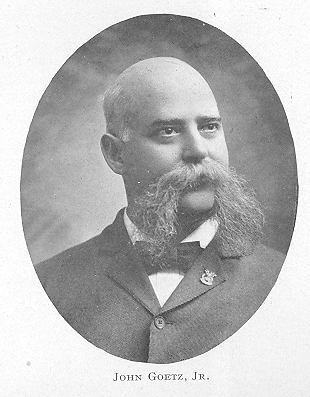
John Goetz, Jr., Deceased, who during a life of usefulness was one of the most representative and progressive citizens of the Queen City, admired for his many lovable traits of character, honorable, kindly of nature, broad-minded, and with an unlimited capacity for making and keeping friends, was a native of the city for which he has done so much. He was of German parentage, and was born on the 28th of January, 1855. His parents were of the plain people, hard working and conscientious, who made many sacrifices to enable their son to obtain a thorough education. It was their ambition that their boy should occupy a position in life higher in the plane of usefulness than that of his forefathers. Consequently, after attending the public and High Schools of his home city, John Goetz, Jr., prepared himself for the profession of law, and entered the famous Cincinnati Law School, from which institution of learning he graduated with the class of 1876. Without influential friends to encourage him, Mr. Goetz, unaided, except by his natural talents, his ability, energy and ambition, started upon his career of usefulness. He practiced law for a couple of years, until after the election of Judge Clement Bates to the position of City Solicitor, Mr. Goetz was appointed an assistant in that office, a position he held for a period of two years, to the satisfaction of Judge Bates, as well as to the people in general. He resigned his position to become connected with the Christian Moerlein Brewing Company, one of the most gigantic and powerful business enterprises in the State of Ohio. To this company he devoted the best part of his life, and for many years he dominated its destinies. At the time of his demise, Mr. John Goetz, Jr., filled the important and responsible position of Vice President of the Moerlein Brewing Company. Notwithstanding the onerous duties of his position as chief executive of this great corporation, Mr. Goetz found time to enter heart and soul into all enterprises originated for the welfare and upbuiluing of the city of Cincinnati ; always ready to assist any worthy cause, not only by his own endeavors, but as well by financial support. When Cincinnati prepared for the celebration of the hundredth anniversary of her existence, and it was decided to hold a large exposition, he
- 455 -
was one of those gentlemen who originated the enterprise, he acting as a member of the Centennial Board in 1888. This exposition attracted the attention of the whole country, and demonstrated the possibilities of Cincinnati as an industrial and commercial center. Since that time there has been no great public movement worthy of the attention of a man intensely public spirited, in Cincinnati, in which Mr. Goetz did not take a prominent and important part: It was thus with the Elks' convention in 1896, with the Grand Army Encampment in 1898 and with the National Saengerfest in 1899, of which Mr. Goetz was Vice President and Chairman of the most important Comthittee of Entertainment. Unfortunately for that enterprise, Mr. Goetz passed aWay previous to the completion of the preliminary arrangements, and it is conceded by those in the position to know, that if that gentleman had lived, the success of the great enterprise would have been assured. As Mr. Goetz was of German parentage, he naturally held in veneration the memory of those hardy and courageous people, who, coming. from the Fatherland, in October, 1686, landed on. American shores, and founded the first German colony in the new world, Germantown, Pennsylvania. To perpetuate their memory in Cincinnati, he, in. 1896, founded the "German Day Association," an incorporated body, to which nearly all the German societies of Cincinnati belong, and which annually celebrates the anniversary of the landing of those German emigrants. The .society, since its organization, has a membership of over 30,000. In 18Q8 Mr. Goetz was elected President of that body. He was also a member and for one term President of the Cincinnati Zoological Garden. In 1888 Mayor Amor Smith, Jr., appointed him a member of the Cincinnati Board of Fire Trustees, and his services in that board were of such an efficient nature, that he was reappointed to the same position by Mayor Mosby and again by Mayor Caldwell. In the fulness of his career of usefulness, death called him away, on the 23d of January,I899. His untimely demise was a shock to the whole community. He left a widow, Mrs. Lizzie Moerlein Goetz, with whom he lived most happily since the time of his marriage, in 1881, and three children, the oldest of whom, a son, Christian J. Goetz, is now connected with the institution founded by his grandfather, and of which his father was Vice President. His memory was honored by the German population of Cincinnati when, on the loth of September, 1899, members of the German Day Association held memorial exercises at his resting place in the beautiful Spring Grove Cemetery. His personality is still fresh in the hearts of the people who knew him, and his memory will be perpetuated for many generations to come.
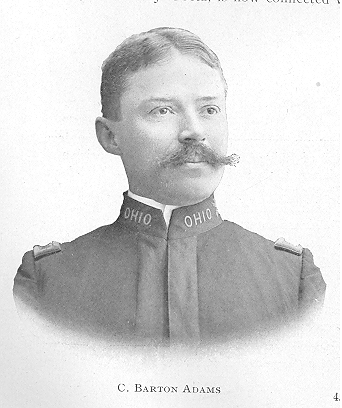
C. Barton Adams, For more than twenty years actively identified with Ohio National Guards, Assistant Adjutant General under Adjutant General Gyger, and since 1902 Superintendent of the Boys' Industrial Home, at Lancaster, Ohio, is a native of the Buckeye State, his life having been spent in Delaware County, save when for a short time he served in the construction corps of transcontinental railways during the period when those great railways
C. BARTON ADAMS - 456
systems were most active in pushing their lines into the far West. It was as a student of the Ohio Wesleyan University that his early predilections for military affairs were first formed, and in this institution was laid the foundation of a military education which has since been developed to an extent that has enabled him to render excellent service to his country and his State. After spending three years in the University, he closed his college career to take tip the railroad work on the plains. After two years he returned to Ohio, and continued in his home State his occupation as a railroad man until elected County Treasurer of his county, serving two terms. On the 13th of February, 1879, while yet a student at college, Colonel Adams enlisted as a private in the Joy Guards, Company K, Fourteenth Infantry. In 1882, upon taking his position with the railroad company, he was honorably discharged, but immediately after his return to the State of Ohio, he enlisted again, and on the 8th of December, 1885, after two months' service, was commissioned First Lieutenant. On the 23d of May, 1887, he was promoted to Captain, and recommissioned to the same grade on the 23d of May, 1892. In the following year he relinquished the command of Company K to accept a commission as Major in the Fourteenth Regiment, to rank from the 5th of April, 1893. On the loth of June, 1896, he attained his next grade as Lieutenant Colonel of the same regiment, retaining his rank and position until the regiment was mustered out by the general disbandment J rders of the lath of April, 1899. At the outbreak of the war with Spain, Colonel Adams, then Lieutenant Colonel of the Fourteenth Regiment, was placed in command of the regiment after its mobilization at Camp Bushnell, on the 23d of April, 1898. He was mustered into the United States service as Lieutenant Colonel of the Fourth Ohio Volunteer Infantry, and proceeded with the command to Camp George H. Thomas, at Chickamauga Park, Georgia. Here he was appointed acting Assistant General Inspector on the staff of General Jam es H. Wilson, commanding the First Division of the First Army Corps. Relieved from this duty, he rejoined his regiment, which had been ordered to join the expeditionary forces for the conquest of Porto Rico, where he rendered signal services. He was made Provost Marshal of the District of Guayama on the 15th of August, 1898, and as such distinguished himself by maintaining perfect peace and order, establishing a new government and advancing a sanitary policy, "all of which is specially commanded" (official records). Upon reports contained in official orders, Colonel Adams was recommended to the President by Brigadier Generals Hains and Grant to be Brevet Colonel of Volunteers. He was mustered out with his regiment at Columbus, Ohio, and immediately upon resuming the duties of citizenship, was offered the chair of Professor of Military Science in the Ohio Wesleyan University. He accepted that position, and held the same until the 8th of January, 190o, when he was appointed by Governor Nash Assistant Adjutant General. Two years later, Colonel Adams was appointed to his present position as Superintendent of the Boys' Industrial Home, at Lancaster, Ohio, an office which he fills with marked ability.
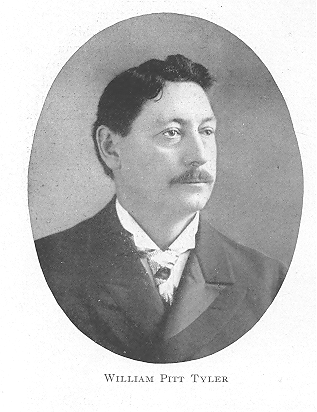
William Pitt Tyler, Deceased, formerly Chief of Police of Columbus, Ohio, and a man who during his life was one of the best-known officers in the United States, was a native Ohioan, born on the 9th of July, 1852, in Fremont, Sandusky County, Ohio. His father, Charles Bristol Tyler, was the first white child born in Fremont, then called Lower Sandusky. At the time of his birth it is needless to say the population of Lower Sandusky was very sparse, and consequently the boy grew up amid surroundings which naturally tend to develop the greatest courage and self-reliance, and these traits were inherited by the son, William Pitt Tyler. Up to his sixteenth year, Mr. Tyler attended the public 'schools of his home town. After
- 457 -
leaving school he for some time worked in a machine shop, but becoming imbued with a desire for adventure, he left his native city and went West, locating in the Black Hills, Dakota, and remaining in the celebrated city of Deadwood for eight years. There he engaged in business pursuits, and while following his business he was appointed mailing clerk, and later became delivery clerk in the post office at Deadwood. After two years he was promoted to the position of Assistant Postmaster. His next public position was that of Deputy United States Marshal under Marshal John B. Raymond, and his ability in that position resulted in his election to the position of Chief of Police of Deadwood. This position, as well as that of Deputy Sheriff of that county, which he held, was one requiring the most absolute courage, for the country in which he had located was overrun with criminals of the most desperate character, gathered from the four corners of the earth. He pursued his duties unfalteringly, and became a terror to the law-breakers, broke up many lawless bands, and brought a large number of malefactors to justice. During this time he had many adventures and most remarkable escapes from death. After three years of active service he returned to Fremont and engaged in business. Governor Foraker upon his election tendered! the position of guard at the State Penitentiary to Mr. Tyler, which was accepted, and he served in that position for four years. At the expiration of that time Mr. Tyler removed to Columbus, he was promoted to the position of Assistant where he became engaged in business, continuing until 1895. In that year he was appointed patrolman of the police force of the Capital City, and soon became Sergeant. In 1896 he left the police force and again became engaged in mercantile pursuits. On the 15th of August, 1899, Mr. Tyler was appointed Superintendent 'of Police of Columbus, which position he held until the time of his death, in January, 1903. His marriage to Miss Jennie Main occurred on the 17th of November, 1897.
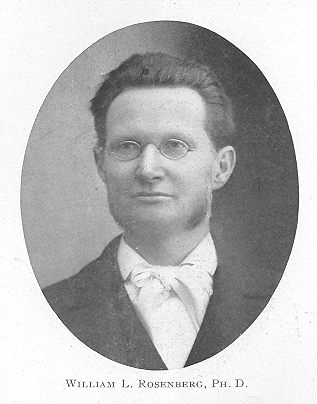
William L. Rosenberg, Ph. D., Director and Manager of the Cleveland Institute for Stutterers, Stammerers and Backward Children, located on Windsor Avenue, Cleveland, Ohio, is a native of Germany, born on the loth of January, 1850, of Lutheran parentage, at Hamm, in the Prussian province of Westphalia. His father was a city official. Dr. Rosenberg enjoyed the advantages of a thorough literary training, and after graduating from the Gymnasium at Potsdam he attended the celebrated University at Berlin, from which institution of learning he graduated in 1873, receiving the degree of Doctor of Philosophy. Dr. Rosenberg started upon his educational career at the age of twenty-six years, in the capacity of teacher of history and ancient languages. In the fall of 188o he emigrated to the United States, landing in New York, remaining in the metropolis of the East for about one year, when he accepted a position as
- 458 -
teacher of languages in Boston, Mass. He filled this position from 1881 to 1882. From Boston he went to Chicago, and later to New York, Cincinnati and Cleveland, in which cities he occupied important editorial positions on daily newspapers. Since 1897 he resides in Cleveland. In 19o1 he founded the Cleveland Institute for Stutterers, Stammerers and Backward Children, assisted and encouraged by a number of physicians. In his capacity as director of that institution, Dr. Rosenberg has become a benefactor of mankind, for he has given speech to a great many people, who, before they underwent treatment in his institution, were deprived of the power of perfect speech. Dr. Rosenberg is particularly adapted to fill the responsible position of director of his institution. During his literary career all his spare moments were spent in the study of psychology and of the organs of speech, in order to thoroughly prepare himself for the career he had decided to embark upon. Dr. Rosenberg has cured the most difficult cases, some of which had been declared hopeless by other specialists. His work has attracted the attention of the medical profession in all schools. Since the establishment of his now famous institution, more than four hundred patients have been treated by him with the greatest success. As the larger percentage of Dr. Rosenberg's patients are not advanced in years, most of them being pupils of public and High Schools, and realizing that their literary training should not be interfered with during their treatment, Dr. Rosenberg has a corps of specially trained teachers who assist the patients in their studies ; consequently their mental development is not retarded. Patients from all over the United States have entered his institution, and with the growth of years his reputation and the fame of his sanitarium ever increases. Dr. Rosenberg is a man of great originality, of broad human sympathies, patient and persevering, and profoundly devoted to the profession in which he has done and is doing so much good. He is an author of many works of fiction and on education.
James Robert Hickman, Chief Executive of the city of Nelsonville, Ohio, and a man of great popularity in his part of the State, was born on the 5th of March, 1856, at Somerset, Ohio. His parents, W. C. Hickman and Katherine M. Porter, were natives of Ohio, and came from good German stock. Mr. W. C. Hickman was a veteran of the War of the Rebellion, having served for five years in the Fifth Ohio Volunteer Infantry Regiment. He died in Nelsonville in the fall of 1898, beloved by all who knew him. His son, James Robert, received his early education in the common schools of Nelsonville, after which he attended High School until seventeen years of age, when he entered into business life in the capacity of a clerk in a drug store. Later he worked in his father's law office, and finally became connected with railroad work in the Nelsonville office of the Hocking Valley. Mayor Hickman has always
- 459 -
been a true adherent of the principles of the Republican party, and has served the party of his choice in many capacities. He was Township Clerk of York Township, Athens County, for seven consecutive terms ; Councilman of Nelsonville for one term, and City Clerk for the same length of time. In the spring of 1902 he was nominated for the office of Mayor on the Republican ticket and was elected in the following election by a large majority. On account of the new code for the Ohio cities taking effect in 1903, Mayor Hickman only served one year in his first term, but he received the unanimous nomination from his party for a second term, and having made a splendid record during his incumbency of the office of chief executive, was re-elected in the spring of 1903, by an increased majority. Mayor Hickman is well known in fraternal circles of the State. He is a member of the K. of P., K. O. T. M., Y. O. A. M., and an Eagle. In 1882 Mayor Hickman was united in marriage to Miss Vesper N. Carmes, and by this union is the father of two sons and five daughters. His residence is located at Franklin Street, Nelsonville, Ohio.
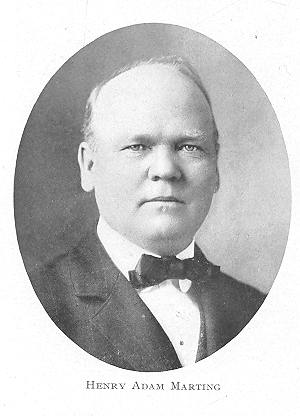
Henry Adam Marting, Of Ironton Ohio, is one of the most influential and best-known business men of Southern Ohio. He was born on the 17th of December, 1850, in Greenup County, Kentucky, and is of German extraction. His father was Henry Marting and his mother Mary Elizabeth (Knaper) Marting. Both were natives of Osnabrueck, Hanover, Germany. Henry Adam Marting was the fifth of his parents' nine children. They removed to Jackson Furnace when he was an infant, remained there for a period of five years and then moved to a farm near Wheeler's Mills, on the Little Scioto. Their son, Henry Adam, obtained his education in the district schools. At the age of nineteen he began to work on the railroad as a section hand. He saved a little money, and after the expiration of two and a half years.he started a store in company with his brother, John C., at Gebhart's Station. He remained there for two years, then sold out and went to Ironton. In 1873 he started in the dry goods business in Ironton, and remained in this business, alone as well as with partners, until the 1st of January, 1902. In 1882, with J. D. Foster, he organized the Foster Store Company, of Ironton, and became Treasurer, a position he held until 1892, when he resigned. He also was instrumental in organizing the Eagle Iron and Steel Company, which manufactured bar and sheet iron. He became President and Treasurer of that company. In 1899 this company sold out to the Republic Iron and Steel Company. In 1896, with Joseph Clutts and Lewis Vogelsong, he organized the Wellston Iron and Steel Company and operated two blast furnaces. He sold out his interests in this company in 1898, to Clutts and Willard. While connected with this organization, he was Secretary and Treasurer. In 1889 he purchased the Aetna furnace and organized a company known as the Marting Iron and Steel Company, of which
- 460 -
he is President and General Manager. He also organized the Columbus Iron and Steel Company, in 1899, and is President and General Manager of that flourishing enterprise. In 1901 he finally organized the Ironton Lumber Company, of which he is a director. Mr. Marting is also one of the founders of the Ketter Clothing Company, of Ironton, and acts as President and one of the directors of that concern. He furthermore is a director of the Citizen's National Bank and of the Ironton Corrugated Roofing Company. Mr. Marting is also senior member of the firm of Marting, Flehr & Company, shoe dealers, he is director and President of the Register Publishing Company, and a director of the Franklin Stove Company, of Columbus ; director of the Crystal Ice Company, of Ironton, and of the Camden Interstate Railway Company. He was a member of the City Council of Ironton for six years, from 1888 to 1894, and was its President for two years. He has a more than ordinary talent for the successful management of business, and has been successful in everything he has undertaken. He was a member of the German M. E. Church, but, in 1897, he became connected with Spencer M. E. Church,, of Ironton, and is a member of the official board of that church. Mr. Marting is also a K. of P. On the 7th of March, 1872, he was united in marriage to .-Nriss Margaret C. Duis, daughter of Mr. Henry Duis. They have one child, Nellie M., the wife of Dr. Clark Lowry, of Ironton, Ohio. Mr. H. A. Marting is a man who stands high in the esteem of his fellow citizens. He is a self-made man in the best sense of the word. His school advantages were meager, but he improved his education whene'ver he had a chance to do so. As his parents lacked the means to give him the opportunity of a higher education, he had to obtain his training in practical life. He always has shown great energy, push and determination, and whenever he undertook anything he never swerved until the goal was reached. In all his deals Mr. Marting has always been fair and strictly honest, and in his financial ventures he always had in mind the giving of employment to others and their welfare. He enjoys giving for good causes, and is happiest when he can help some one struggling for relief. A more tender-hearted man can hardly be found. No wonder that he enjoys the friendship and esteem of everyone he comes in contact with.
William T. Tucker, Postmaster of the City of Toledo, Ohio, is one of the best-known Republicans in the northwestern part of the State. Mr. Tucker is an Ohioan, born on the 6th of October, 1849, at Laporte, Lorain County, the son of Dr. John A. Tucker and Eliiabeth Brush-Tucker. His ancestors on his father's side were Quakers who were prevented by their policy of peace from waring for American independence, consequently the family name is not mentioned in the historical data of the War of the Revolution, but on his mother's side there were many members of the family who took an active part in that tremendous struggle for independence from the English yoke, as well as in the following Indian wars and the war against England in 1812. The family of Mr. Tucker's grandfather came to Ohio in 1816, while his mother's father settled in Lorain County in 1832. Mr. Tucker received his early education in the common schools of Huron County, at the Normal School at Milan, at the Universities of Yale and Cornell, where he remained for one year, rounding out his edUcation by four year's study in the Baldwin University, at Berea, Ohio. He later read law with Haynes & Potter, of Toledo, and in 1876 he was admitted to practice. For ten years he was engaged in the Practice of his chosen profession in connection with J. T. Greer, building up a lucrative practive. After the dissolution of partnership, Mr. Tucker practiced independently, making a specialty of real estate and probate business. Mr. Tucker has always been affiliated with the Republican party, and has rendered many valuable services. Many times he has been Chairman of
- 461 -
Congressional and Executive Committees, as well as delegate to State and National conventions. He also has served for many years as a member of the School Board of Toledo. On the loth of April, 1884, Postmaster Tucker was united in marriage to Miss Harriet van Gorder, a daughter of Mr. George W. van Gorder, of Warren, Ohio. The position of Postmaster, which Mr. Tucker now so ably fills, was given to him in recognition of his services by the late President, William McKinley.
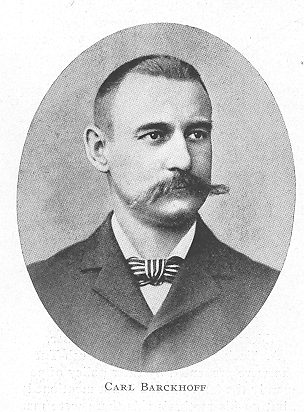
Carl Barckhoff, President and originator of the celebrated organ manufacturing concern, the Barckhoff Church Organ Company, of Pomeroy, Ohio, is a native of Germany, being born on the 31st of May, 1850, at Wiedenbrueck, Westphalia. The knowledge and genius which he has displayed in the manufacture of organs was inherited from his ancestors, who for several generations were engaged in the making of organs. His grandfather, Carl Barckhoff, as well as his father, Felix Barckhoff, were well-known organ builders in the old country. Mr. Felix Barckhoff emigrated to the United States in 1865, settling in Philadelphia, where he established a business of his own. His son, Mr. Carl Barckhoff, remained in Germany to finish his education on the Progymnasium at Wiedenbrueck, the Academy at Muenster, and at the celebrated University of Goettingen, where he studied law. In 1869 Mr. Barckhoff entered the German army. While performing his duties toward his country as a soldier the bloody Franco-Prussian War broke out, that resulted in the overthrow of the empire of the Third Napoleon and the establishment of the French Republic. Mr. Barckhoff participated in that tremendous struggle and served all through the war in a cavalry regiment, taking part in many sanguinary battles. After the close of hostilities, in 1872, he crossed the Atlantic, came to this country and worked with his father in Philadelphia. After his father's death, in 1877, he removed the business to Pittsburg, later to Salem, where he could not agree with his partner, and from there to Mendelssohn, Pa. Here, unfortunately, his growing factory was wiped out by fire. But not discouraged by this calamity, he again opened temporarily a factory at Lathrobe, Pa., which factory, in 190o, was removed to Pomeroy. Here the business became quickly rooted in the soil of prosperity and has flourished, until today his enterprise has spread over an area of business activity second to none in this country. When Mr. Barckhoff came to Pomeroy he employed thirty skilled artisans. Today i To are enrolled on the payroll of his concern. Mr. Barckhoff's specialty are large pipe organs, some of the largest of which are to be found in the Erie Cathedral, the Church of the Gesu, at Philadelphia, and the Church of St. John the Baptist, at Brooklyn, N. Y.
- 462 -
Thomas J. McDonough, Superintendent of the Bridge Department, of the Hocking Valley Railroad Company, and Councilman of the Third Ward, of the city of Lancaster, since 1896, was born on the 18th of June, 1856, in Marietta, Ohio. His immediate ancestors were Laurence and Ann Stankard Mcgonough, both of whom were natives of Galway County, Ireland, emigrating to the United States in 1848. The family settled in Marietta, where the father became a contractor on the Memphis & Cincinnati Railroad, which afterwards was a part of the B. & 0. Railroad. Mr. McDonough received a common and parochial school education. After leaving school he began to learn the carpenters' trade under direction of an elder brother, Michael, in Marietta. When he had mastered his trade Mr. McDonough removed to Crawfordsville, Ind., where he remained working as a carpenter for two years. In the year of 1881 he settled in the city of Lancaster, entering the employ of the Hocking Valley Railroad as a bridge carpenter. He was soon advanced to the position of foreman and finally became Superintendent of the Bridge Department of that railroad, having charge of this branch of work along their various lines. The advance of Mr. McDonough from a laboring man to the position of trust which he now holds is a high tribute for his mental equipment, conscientiousness and executive abilities. He possesses all the practical knowledge necessary for the discharge of his enormous duties. In political belief lie is a Democrat, and was honored by his party in 1896 with the nomination for City Council, to represent the Third Ward of his home city in that body. Since that time he has continuously held that position of honor, and since 1903, after the new code of the municipalities of Ohio took effect, he is President of Council. Another position of trust which he has held was President of the City Library. In 1885 he was united in marriage to Miss Clara Zink, a well-known lady of Lancaster, and by that union lie has one son living, George Harold NI cDonoug-h.
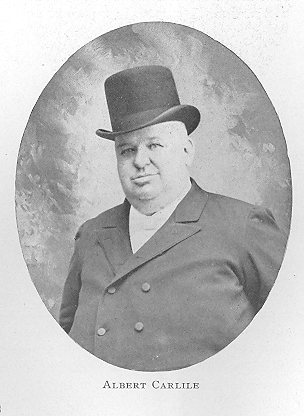
Albert Carlile, Mayor of the city of Salem, Ohio is a native of that city, and was born on the 1st of January, 1846. His parents were James and Elizabeth McDevitt Carlile, both of whom were born in Ohio. After having received his education in the public schools of Salem he started in active life at the age of 21 as a commercial salesman, which occupation he followed from 1867 to 1892, later engaging in the wholesale grocery business. "Al" Carlile, as he is familiarly known by his friends, is a man of broad human sympathies, of a kindly and jovial nature, as the following extract from John Splan's book, "Life With the Trotters" (1889), will show. It should be mentioned here that Y r. Carlile was for eighteen years prominently identified with the turf. "As a merchant Al Carlile has proved himself a man of rare ability. Very temperate in habits, never having smoked a cigar or taken a drink of liquor under any circumstances, always ready to back his
- 463 -
opinion with his money, on anything from the Presidential election to a hundred yard foot race. As a friend .he is true blue, as many a man on the turf today has reason to know from the fact that at some time during his career Al Carlile has bridged him over a financial difficulty." Becoming early "in life interested in the political affairs of the country, he soon attracted the attention of the leaders of the Democratic party, to which organization he became allied. As a Democrat he is of the school of Jefferson, Tilden, Thurman, Grover Cleveland and Alton B. Parker. In ,1892 Mr. Carlile was appointed by President Cleveland Inspector of Furniture and Furnishings for all United States buildings, under the control of the United- States Treasury, serving 'from 1892 to 1898. The honorable position he now holds, as Mayor of Salem, is the only elective office held by him. Mr. Carlile is a veteran of the Civil War and saw three years active service ; he was a member of Company D, of the Nineteenth O. V. I. Upon two occasions Captain Thomas Stackpole was honored with temporary detail by General George H. Thomas and General William S. Rosecrans for special services rendered by his chief clerk, Al Carlile in issuing rations to his commands on the battle fields of Stone River and ,Chickamauga. He is a member of 'but two organizations, the Eagles and the G. A. R., outside of belonging to the International Brotherhood of Confirmed Bachelors. His office is at the City Hall at Salem, and his residence is located at 347 Lincoln avenue, of that city.
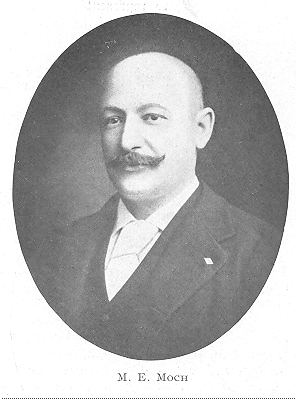
M. E. Moch, Senior member of the Cincinnati firm of Moch, Berman & Company, the celebrated manufacturers of "Wellworth" clothing, is one of the most progressive and popular business men of the Queen City. He is a native of the city mentioned above, and was born on the first of January, 1855. He has spent all ,his life in the business in which he is engaged, and is looked upon as an authority in all matters pertaining to the clothing business. In the year of 188o Mr. M. E. Moch organized the firm which bears his name. Largely through his ability the concern has flourished, until today it stands foremost in all similar institutions of the country. Notwithstanding the large mercantile interests with which he is connected, Mr. Moch has identified himself with many of the leading charities and benevolent institutions of his home city. He is prominently connected with the Jewish Hospital and is a director of the same, and also occupies the same position with the Home for the Jewish Aged and Infirm. He is Vice President of the National Automatic Fire Alarm Company, of Cincinnati ; Vice President of the Cincinnati Trust Company, director of the Cincinnati Gas and Electric Company, and a director of the Citizens' National Bank. Mr. Moch is a thirty-second degree Mason, a member of the Order of the Nobles of the Mystic Shrine and of the Elks. He is also a member of the Business Men's and Phoenix Club, a Royal Arch Mason, and a director of the Wholesale Clothers' Association of Cincinnati.
- 464 -
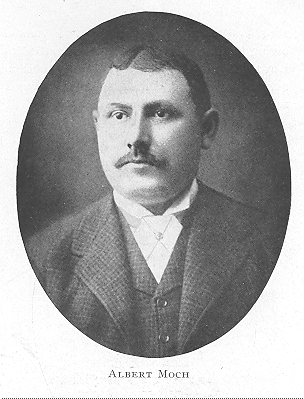
Albert Moch, Of the firm of Moch, Berman & Company, Cincinnati, Ohio, manufacturers of the celebrated "Wellworth" Clothing, was born on the 2nd of March, 1856, in the city in which he has been actively engaged in business all his life. He is the son of Mr. Elias Moch, one of the pioneers and well-known business men of the Queen City. Mr. Moch received a careful education in the schools of his home city. After finishing his studies he became identified with the clothing interests of Cincinnati. He is a man of splendid physique, most affable in manner, highly qualified in business matters with keen executive abilities, and is one who makes and keeps the friendship of all those who come into personal contact with him. Mr Moch is a man of natural benevolent disposition, he is active in the charitable institutions of his native city, and is particularly connected with the Jewish charities of Cincinnati. He is a Trustee of the Plum Street Temple, one of the foremost Synagogues in the United States. Socially, Mr., Moch is a prominent member and recognized leader in all the influential clubs of this city. He is a thirty-second degree Mason and a member of the Order of the Nobles of the Mystic Shrine, and a Royal Arch Mason. His offices are located in the splendid new edifice erected by his firm in 1901 at the corner of Elm and McFarland streets, Cincinnati, Ohio.
Alexis Cope, Who occupied the position of Secretary of the Ohio State University from 1884 to_ 1904, is a man of high mental attainments and well and favorably known in educational circles all throughout the State. He is a native of Ohio, born on the 27th of June, 1841, at Colerain, Belmont County. His parents were Caleb H. and Mildred R. Fowler-Cope. Mr. Cope attended the public schools of his home district, after which he entered Hopedale Normal Institute. The outbreak of the Civil War interrupted Mr. Cope's studies. When President Lincoln issued his first call for volunteers, Mr. Cope was among the first who offered their services to their country, and on the 22nd of April, 1861, he enlisted as private in the Seventeenth Ohio Volunteer Infantry Regiment for a term of three months. He served in the Rosecrans campaign in West Virginia, and at the expiration of his term re-enlisted in the fall of 1861 as a private in the Fifteenth Ohio Volunteer Infantry. For gallant and meritorious service he was promoted from private to Captain, and served in the Army of the Cumberland until the 1st of January, 1866, when he obtained an honorable discharge. During a part of his service he was Adjutant of his regiment, Adjutant General of the brigade and division, and Division Inspector-General. After his return from the war Captain Cope took up the practice of law, and in September, 1866, he was admitted to the bar. Captain Cope is a life-long Republican. In the year 1873 Captain Cope was appointed Internal Revenue Collector for the Sixteenth Ohio District by President Grant, and from 1877 to 1883 he was Chief Clerk to the Secretary of State. He accepted the position of Secretary of the Ohio State University in
- 465 -
1884, and during the following two decades he was of inestimable value to that institution, owing to his executive ability and careful training. Socially, Captain. Cope is a member of the Loyal Legion, the Army of the Cumberland and the Columbus Board of Trade. He was married on the 22nd of October, 1868, to Miss Ione Lewis, of St. Clairsville, Ohio. His residence is in Columbus, Ohio.
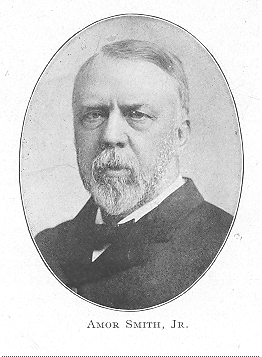
Amor Smith, Jr., manufacturer, twenty-first Mayor of Cincinnati, was born at Dayton, Ohio, October 22, 1840, son of Amor and Sarah (Spencer) Smith. His mother was the daughter of Jeremiah and Anna (Hobson) Spencer, who came from Hull, England, in 1816. The first paternal ancestor in America was John Smith. Amor Smith, Jr., received his early education at Cincinnati, where his parents located when he was 7 years old. After attending the common schools and Herson's Private School, he entered the Swedenborgian University, Urbana, Ohio, in 1857. In 1865 be became a partner with his father in the manufacture of candles, soap and fertilizers. This business was founded in 1840 at Dayton, Ohio, by his father, who invented a wheel for reducing cracklings, a press plate for extracting lard and tallow from cracklings and a perforated dryer for the manufacture of ammonical matter. It was later carried on at Cincinnati, Ohio, under the name of Amor Smith, until 1866, and thereafter as Amor Smith & Company. In 1868 a branch was established in Baltimore, Md., under the name of Amor Smith & Sons, the other partners being his father and his brother, Leander Smith. This they sold to Gilpin & Moores, of that city, in 1894. In 1870 Mr. Smith was elected a member of the Board of Aldermen, of Cincinnati, and Chairman of the Street Committee, and by virtue of that office he became a member of the Board of City Commissioners. In 1876 he served as Chairman of the Campaign Committee of the $6,000,000 bond issue voted to build the Cincinnati Southern Railroad, the greatest railroad enterprise ever projected by a single city, and in 1878 had charge of a second loan of $2,000,000. Always an active partisan, his ability as an organizer was recognized by his election as Chairman of the Hamilton County Republican Executive Committee in 1875. That year he carried the county for the whole Republican ticket in face of the Democratic supremacy of the five previous years. President Hayes appointed him Collector of the First Internal Revenue District of Ohio on June 8, 1878, and he served three and a half years, handling $12,000,000 per annum without discrepancy. Relieved of his official duties, Mr. Smith resumed his position as an active member of his father's two firms, enjoying the respect and confidence of the business community. In 1880 he served on the committee which negotiated the purchase of the old Government Building in Cincinnati for the uses of the Chamber of Commerce, they paying the Government $100,000. In 1882 he was nominated for Congress, and in 1884 was chosen a delegate to the .
- 466 -
National Republican Convention. Mr. Smith was elected Mayor of Cincinnati in 1885, reelected in 1887, he having established himself as a safe leader through his wise counsel and unerring judgment. The elements that have made him successful in his business career were exactly calculated to fit him for the many positions he has held in City, County, State and Federal affairs. His sincerity can not be questioned, for he has been absolutely fair with all interests committed to his keeping. He came into office when the municipal affairs were in a state of confusion, and, in some departments, it was the least of the shortcomings. Under his management the city became a model municipality, the result of his common sense methods and straightforward execution of his duties. In the year 1886, as Chairman of the Board of Revision, the "rottenness" of the City Infirmary was brought to light, and the guilty parties prosecuted. During his administration he served as Chairman of the Advisory Committee on specifications, an adjunct to the Board of Public Works in the matter of expending $4,000,000 in improving the streets of Cincinnati When the Board of Public Works was superceded by the Board of Public Affairs, the Advisory Committee ceased to exist, its work was practically done as the streets of the city bear eloqUent testimony' today to the care and thoughfulness with, which this committee served wholly without pay. In the spring of 1886 occurred one of those crises which come to every large American city now and then labor troubles broke out in Cincinnati, as they did in St. Louis, Milwaukee, Chicago and elsewhere. That the scenes of those cities were not duplicated was due to the cool head and indomitable will of its Mayor. Just two years previous Cincinnati had marveled at the phenomenon of a mob in her streets, the memory of which had been made perpetual by the loss of more than a million dollars to the taxpayers, with the consequent incalculable damages through the burning of her Courthouse. Therefore, conservative citizens may be pardoned for fearing that Cincinnati might furnish a companion picture to the scenes in the Haymarket of Chicago. The freight handlers of the Cincinnati, Hamilton-. & Dayton Railroad, numbering three hundred, "struck" for increased wages. They marched in a body from the Western, to the Miami Railroad, in the Eastern part of the city, intending to force the men of that road to join them. However, they were intercepted by Colonel Arthur Moore and sixty police officers, who forced the strikers to retire. The strikers then drove the men who were laying the new streets from their work, and the contractors were compelled to call upon the Mayor for protection. The Mayor then issued a proclamation assuring protection to all who would resume work. This was followed by a visit from two delegates sent by the strikers to protest against this action, assuring him, if he persisted, that "bloodshed" would follow. He replied : "If you start it, I will end it, for I am ready." Mayor Smith and Colonel Suttin (in charge of the U. S. Subtreasury) then sent a joint dispatch to the Secretary of War asking for military protection. Colonel Aufley, of the United States Army, with 250 men, were ordered from Columbus to Cincinnati. Governor Foraker ordered Adjutant General Axline, with five regiments, to also report to that city. There were then thirty thousand men on a strike, and the factories were empty. Everything was apparently quiet, 'but it was felt that the situation was worthy of the gravest consideration. The troops were not called to put down a mob or quell a riot, but as a preventative. This action was denounced by the more turbulent element. The Mayor then called a meeting, through the press, of all the representatives of the various labor organizations engaged in the strike. This meeting was duly held, Mayor Smith presiding, and James N. Morely, of the strikers, acting as Secretary. The situation was fully and amicably discussed. Mayor Smith took the ground that the differences between the strikers and their employers were matters to be settled between themselves, but a breach of the peace was a matter in which it became the duty
- 467 -
of the authorities to interpose in the interest of law and order. That, he promised emphatically, would be done, and there was no mistaking the firmness of his intention. There was no occasion; however, in which to test his power and disposition. That an ounce of prevention its worth a pound of cure was readily conceded with a glance at the then rebuilding Courthouse. In March, 1886, the bill creating the non-partisan police force for Cincinnati passed the General Assembly of Ohio. It placed the Mayor at the head of the Police Department, and it fell upon him to nominate the Superintendent, as well as applicants to the force, subject to confirmation by the Board of Police Commissioners. In the winter of the following year the Governor, by an act of the Legislature, appointed a Board of Water Works Commissioners, authorized in statute in 1888 (See Ohio laws, vol. 85, p. 53), to examine into the complaints regarding the water supply of the city and the confessedly great difficulty to remedy the matter. Of this commission Mayor Smith was chosen President. In 1898-99 he was a member of the Board of City Affairs, and during 1889-94 was Surveyor of Customs at the port of Cincinnati, to which office he was re-appointed March 16, 1903, for a term of four years.
Mr. Smith is a Scotish Rite thirty-second degree Mason, a member of the Syrian Shrine, Young Men's Blaine Club, Stamina Republican League, Order of Itan-nic-nics and Exalted Ruler of the Order of Elks. He was married May 27, 1863, to Mary Jane, daughter of Henry Kessler, of Cincinnati. She died in Baltimore, Md., Thanksgiving Day, 1873. Mr. Smith having moved to that place for a short time. August 3, 1887, he married Ida Sennett, daughter of Abner H. and Amelia (Tuesdale) Sennett, and, on her mother's side, a descendant of Peter Brown, of the Mayflower. Mr. Smith has two sons and a daughter by his first ivife.
E. S. Willard, Of Wellston, Jackson County, Ohio, was born in Cincinnati, Ohio, on the 31st of August, 184.9. His father having died when Mr. Willard was but four months old, he was reared in the home of his stepfather, Orin B. Gould, of Scioto County, Ohio. Mr. Willard received a thorough education in some of the best schools of the State and the East. After finishing his education he embarked in the iron business, a knowledge of which he had acquired from Mr. Gould, who was one of the pioneer iron men of Southern Ohio. In 1873 Mr. Willard came to what is now Wellston, at that time consisting of but one house, owned and occupied by H. S. Bundy, and here he erected the Milton furnace for the manufacture of pig iron, at the same time establishing a large coal industry, he being the first operator in the field who produced coal to ship. From that beginning has resulted the Jackson and Wellston coal field, which has attained an extensive reputation. In 1887 he disposed of his interests in the iron industry, confining his time and attention to the coal trade, and became connected with the Superior Coal Company, the largest concern in the Jackson and Wellston field, besides which he holds large interests in several other companies of a similar nature. In 1898 Mr. Willard again became identified with the iron industry, when, in company with Mr. Chitts, he became the owner of the Wellston Iron and Steel Company. The growth of Wellston from a single house to a substantial city with a population of 10,000 people, has been watched by Mr. Willard with absorbing interest, and its development and progress have been largely due to his ceaseless energy and unselfish ambition in advancing its welfare. He has closely identified himself with every industry inaugurated in that city from the time of its first inception up to the present moment. Among the other enterprises he has fathered is the First National Bank, of which he is President. Mr. Willard is a Republican and cast his first ballot for General Grant in 1872, since which time he has been a leader of his party
- 468 -
in his section of the State. He has attended many of the State, Congressional and District Conventions, and, in 1896, was appointed an Alternate to the National Convention, held in St. Louis, Mo. In his home county and city Mr. Willard takes a particular interest in its political life, and for many years was a member of the Wellston City Council, during a part of which time he was the only Republican on that board. He is a man of great business ability, broad-minded and unassuming, and one who has done more practical good for Wellston than any other man.
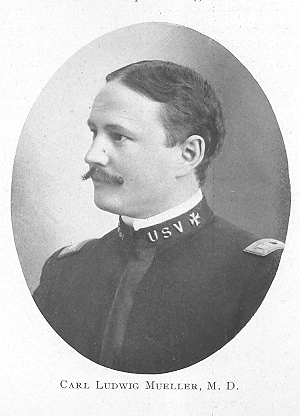
Carl Ludwig Mueller, M. D., Is a man well and favorably known in the western part of Ohio, where he is located in the pretty little city of Wapakoneta, Auglaize County.
Dr. Mueller is a native of Germany, and was reared and educated in his native land. After graduating from one of the leading classical schools of the Fatherland, he pursued the study of medicine at the Universities of Munich and Marburg, where he received his diploma as a physician in December, 1888.
After spending several years as assistant surgeon in hospitals, Dr. Mueller accepted a position as surgeon on a steamer and visited, in this capacity, nearly every known country of the globe. In 1893 he settled in Wapakoneta and took up the practice of his profession in that city. He soon became recognized as one of the leading physicians in that part of Ohio and obtained a large and lucative practice.
On the 15th of March, 1898, shortly before the outbreak of the Spanish-American War, Dr. Mueller became connected with the National Guard of Ohio as Captain and Assistant Surgeon of the Second Ohio Regiment. On the loth of May, 1898, he was mustered into the United States service in the same capacity, and went with his regiment to Chickamauga Park. In July he was transferred from his regiment to the Reserve Hospital of the First Army Corps, which was under orders to go to Porto Rico. He served in Porto Rico as Executive Officer of the General Hospital in Ponce and afterward in the same capacity at the Division Hospital at Coamo, where he remained until ordered to return to the United States. On the loth of February, 1899, he was mustered out of the United States service, and obtained also an honorable discharge from the O. N. G. He has been at Several times offered a position in the Philippines, but he preferred to stay in the United States.
The Doctor is very popular in his home county, and a factor in local politics. He is an active member in Masonic and Pythian circles, and 'belongs also to the Society of the Porto Rican Expedition, Naval and Military Order of the Spanish War, and the United Spanish War Veterans. He is very prominent in the latter society, having been elected- to the office of Department Commander of Ohio. The prosperous condition of the DepartMent of Ohio is largely due to his efforts. He lives with his wife and family in Wapakoneta, where he is surrounded by a host of friends.
- 469 -
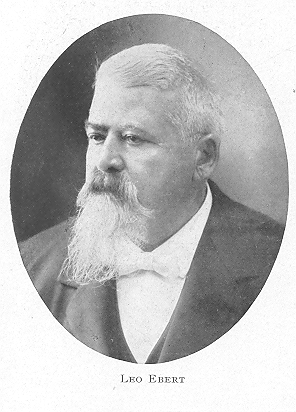
Leo Ebert, A prominent brewer, of Ironton, Ohio, and one of the most popular citizens of that thriving community, was born on the 28th of June, 1837, at Klingenberg, Bavaria, near the city of Frankfort. His parents were John Anton and Barbara Kreutzmann. Mi. Ebert is the scion of a family of brewers, his father and forbears having been engaged in that art for a number of generations. Mr. Ebert was the eldest of four children, and was educated in the schools of his home, until he had reached the age of twelve, when he was placed by his father in the 'brewery to be initiated into the mysteries of brewing. For several years he studied this business in Mannheim, Bremen and other places ; then he went home and stood his chances in the conscription for the army. Drawing, however, a high number, he got off. At the age of twenty-one, Mr. Ebert was united in marriage to Mathilda Uihlein, and emigrated to the United States, in 1859. Landing in New York, he worked for nine months at his business, and then came to Cincinnati. Not being able to find immediate employment in his trade, he was compelled to work one summer in a brick yard. Afterwards he obtained a place in a brewery, starting as a laborer in two months' time he was made foreman. For sixteen months he held this position in Cincinnati, when he removed to Ironton in 1861, and established a brewery in that city. From this time his success has been steady and rapid. He is interested financially in several other local enterprises, and is looked upon as one of the leading citizens in his part of the State. Originally Mr. Ebert was a Republican, but in 1872 became affiliated with the Democratic party, to which body he has belonged ever since that day, always taking an active part in the councils of his party, as well as on the stump during numerous campaigns. For seventeen years he has held public offices in his home city, as Councilman, member of the School Board and member of the Board of Health. Twice he has been honored by his party with the nomination for Congress, and while he was defeated, owing to the large Republican majorities in his Congressional district, he brought out the full vote of his party and greatly reduced the natural majority of his opponent. Mr. Ebert is a self-made man in the fullest meaning of the word, and his career has been mapped out and completed by his own unaided efforts. He is a man of commanding appearance, broad human sympathies, brilliant intellect and generous to a fault. He is a splendid conversationalist, and has a remarkable gift as an orator. For eight years he was President of the Ohio Brewers' Association, and for two years President of the National body. He is a member of the I. 0. 0. F., Elks and K. of P. His family consists of his wife, five daughters and one son; Otto, who follows in his father's footsteps, having thoroughly acquired the knowledge of brewing, and has practical charge of his father's brewery.
- 470 -
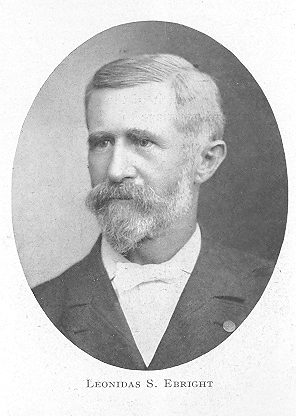
Dr. Leonidas S. Ebright, One of the leading physicians and prominent citizens of Akron, Ohio, and Postmaster of that thriving city, is a son of George and Rachel (Hathaway) Ebright, and was ushered into life in Fairfield County, Ohio, on the 26th of September, 1844. He enjoyed the advantage of the common schools of his native county, and had not yet emerged from the 'teens at the time the Civil War came on. Patriotic and ambitious, he was eager to join the ranks of the Union army, and in May, 1862, before he was eighteen, he enlisted as a member of the Eighty-fifth Ohio Volunteer Infantry. With this regiment he served until October, 1862, when he was discharged by reason of expiration of term of service. He enlisted again on the 1st of April, 1864, in the Eighty-eighth O. V. I., when he was assigned to clerical work, in which capacity he served until discharged, in July, 1865. In February, 1866, the subject of this sketch came to Akron, Ohio, and began the study of medicine in the office of Drs. William Bowen and Thomas McEbright later matriculating at Charity Hospital Medical College, where he graduated in February, 1869. Still later he spent thirteen months in Germany, where he further prepared himself for his chosen profession and upon his return to America located in Akron, where he has since been actively engaged in the practice of medicine, and where his skill as a physician and his gentlemanly bearing have gained him a large and representative patronage. He has the honor to belong to numerous medical societies, County, State and National, and has served four years as one of the health officers of Akron. In 188o he was the choice of a large constituency for a seat in the Ohio State Legislature. He was President of the Decennial Real Estate Board of Equalization of Akron for the year 1890. On the 27th of July, 1897, Dr. Ebright was appointed Postmaster at the city of Akron. He has always been an enthusiastic Republican. For four years he was Surgeon General of Ohio, with the rank of Brigadier General. The Doctor has a wife and two daughters. He was married on the 15th of November, 1883, to Miss Julia A. Bissell, of Sharon, Medina County, Ohio.
Melvin L. Milligan, One of the active business men of the city of Springfield, Ohio, was born on the 28th of July, 186o, in Perry County, Ohio. His parents were Alfred P. and Rachel Iliff Milligan. Mr. Milligan was reared on a farm, and received his early education in the district schools of Perry and Morgan Counties, later attending the Zanesville Business College and the Ohio Wesleyan University, from which latter institution he graduated in 1884. The degree A.M. was conferred upon him three years later. After his graduation from college, Mr. Milligan took up the study of law, and was admitted to the bar before the Supreme Court of
- 471 -
Ohio. Subsequently he went to Kansas City, Missouri, where he opened an office, but later he became connected with the Associated Press. In the fall of 1891 he returned to Ohio, locating in Springfield, and since that time has been a representative of the industrial interests of that city, becoming financially connected with the Springfield Foundry Company, incorporated in 1892 with a capital of $300,000. For four years Mr. Milligan acted as President of that company, until 1902, when the Springfield Foundry Company was merged with and reorganized as the Fairbanks Machine Tool Company, of which corporation he is now the President an& General Manager. In 1901, Mr. IVIilligan became the chief executive of the city of Springfield, serving in that capacity for one term. In political affairs Mr. Milligan is recognized as a leader in the Republican ranks, and his name has been identified with Ohio Republican politics for many years. A public spirited man, he has assisted all enterprises for the benefit of the people of his city. On the 30th of August, 1887, Mr. Milligan was united in marriage to Miss Jennie Fairbanks, a sister of the now Vice President of the United States. Five children are the issue of this union.
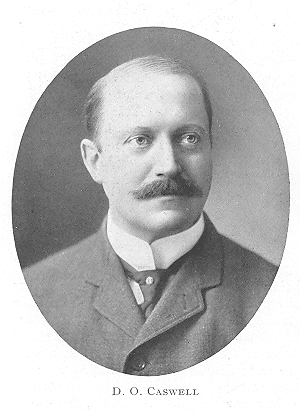
D. O. Caswell, A leading real estate dealer of Cleveland, Ohio, is a native of this State, and was born in Medina County on the 17th of April, 1857, the son of Charles Caswell, a native of Brattleboro, Vermont, and Sarah A. Landon, a descendant of an old New England family; whose members took an active and prominent part in the American struggle for freedom and independence. The Caswell family dates its history in the State of Ohio from the year 1831, when Mr. Caswell's father became a pioneer in the county mentioned above. He was of English origin, born in i8o8, and died in 1859. The subject of this sketch received his education in the public schools of the State and at the Normal College at Lodi, Ohio. When eighteen years of age he entered the drug business at Lodi for the purpose of studying pharmacy, remaining there two years. At the termination of that period, Dr. N. H. Ambler, his cousin, offered him a position in Cleveland to assist him in managing his large real estate business. Upon the death of Dr. Ambler, Mr. Caswell was appointed administrator of his estate, and while engaged in that capacity he developed into the real estate business in Cleveland on his own account, and became a general buyer and seller of real estate. Mr. Caswell has taken a keen interest in the development of the city and the public welfare, and gave to the city the Ambler Parkway, as well as aiding to obtain the Shaker property in the same manner and for the same purpose. By his enterprise, in all about three hundred and fifty acres have been accrued to the welfare of the people. Among the Republicans of Cleveland few occupy a more prominent position than Mr. Caswell. Not alone by reason of his active interest in political affairs, but as well by his natural affableness of manner, broadness of mind and intellectual attainments. In 1892 he served as Coun-
- 472 -
cilman from the Sixth District, and was re-elected in the following year by the largest majority on the Republican ticket. He is a member of leading social and business organizations in his home city, and was formerly Captain of the Cleveland Gatling Gun Battery. Mr. Caswell is married, and is the proud father of three boys. His offices are located in the Chamber of Commerce Building, Cleveland, Ohio.
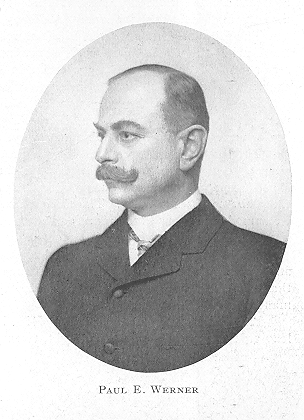
Paul E. Werner, President and General Manager of The Werner Company, at Akron, Ohio.—Paul E. Werner was born on the 5th of May, 185o, in a narrow valley of the Suabian Alps, near Goeppingen, in the Kingdom of Wurttemberg. His father was an official in the civil service of the State, and died only in February, of 1904, at the high age of ninety-five, having been decorated several times by the King and the government for long, meritorious and honorable services.
The subject of this sketch attended the schools of his native country until he came to this country, arriving at Cleveland in 1868, where his first occupation was the performance of manual labor on the streets of the West Side of Cleveland. A diligent study of the English language soon enabled him to improve his position, and for a short time he served as clerk in a grocery and dry goods store at Cleveland. After that he came to Akron, where he found employment as clerk in various stores, first in a grocery store, then in a drug store, and then in a clothing store: In 1872 he obtained a position as bookkeeper and cashier of Miller, Thomas & Co., at that time a prominent firm of lumber dealers, and manufacturers of building materials and contractors. This position he held for three years. He then acquired the ownership of a German newspaper published at Akron, Ohio, entitled "The Akron Germania." After having embarked in the newspaper business, and finding it difficult to make ends meet, he undertook the publication of English daily and weekly newspapers. In connection with the newspapers which he owned, he established a commercial printing department on a moderate scale. In 1885 he disposed of all his newspapers, devoting himself entirely to the general printing business, in which direction he succeeded rapidly, and had in his employ in the year 1888 about one hundred and twenty-five people. Not satisfied with his facilities and equipments at that time, he enlisted additional capital and organized a stock company under the name of "The Werner Printing and Lithographing Company," which name was afterwards changed to "The Werner Printing and Manufacturing Company." With the large increase of facilities the business increased very rapidly, so that in 1888 a further large increase of capital was acquired, and the land purchased where the great book factory of The Werner Company is located at Akron, Ohio, to-day. Large buildings, specifically designed for the business, were erected immediately and occupied on the 1st of January, 1890. In 1892 the capital of the company was again increased and its name changed to
- 473 -
"The Werner Company." From that time on, year after year, additional equipment and additional buildings were added, so that in the year 1893 the establishment easily ranked as the largest book factory on the American continent, which position it has maintained until the present day.
The business of The Werner Company comprises under one roof and under one management all the kindred graphic trades. It ,supplies the means of the material subsistence directly and indirectly for from 4,000 to 5,000 of Akron's inhabitants.
The following statistics will be of interest :
During the year 1903 it received raw materials and shipped out finished products representing a capacity of over 1,5oo carloads, comprising over 3,500,000 volumes of large books, over 20,000,000 catalogues, and millions of other miscellaneous articles.
If the books which were manufactured by The Werner Company during the past year were piled up one on top of the other, this pile would reach Ho miles into the air. If the books were laid side by side the long way, the string would reach boo miles.
The raw materials required for the products of this company for the past year comprise over 3,500 different kinds. The principal articles are paper, cloth, leather and gold. If the sheets of paper consumed during the past year were laid side by side they would encircle the globe nearly five times. The cloth consumed was over 5,500,000 square feet. The leather consumed- of various kinds required the slaughter of 28,000 cows and steers, a herd of 35,000 sheep and 40,000 Persian and Morocco goats. Over 3,500,000 leaves of gold were consumed.
As an evidence of the widespread reputation of this great business, originated, organized and managed at all times since its existence by the subject of this sketch, it may be stated that not one single traveling man is employed to keep continually in full operation this great manufacturing institution.
Paul E. Werner was married to Miss Lucy Anna Denaple in 1873, who died in 1900, leaving three sons, aged twenty-eight, twenty-seven and twenty-six years, respectively. The oldest, Edward, is Superintendent of the factory of The Werner Company ; Frank, the second son, is a portrait artist at Berlin, Germany; and the youngest, Richard, is Vice President of The Werner Company. The oldest and the youngest of the three sons are married, and live at Akron, Ohio, at the residence of their father.
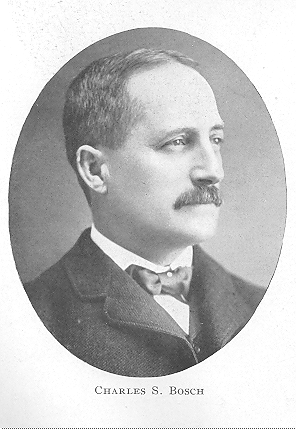
Charles S. Bosch, Mayor of the thriving city of Hamilton, Ohio, was born on the 11th of July, 1858, in Butler County, Ohio. He is the son of Fred Bosch, a well-known farmer and business man, who emigrated to this country from Germany in 1849. Mayor Bosch received his early education in the public schools of Hamilton, and at the age of but thirteen years started to earn his living expenses by his own efforts, working in a printing shop for some time. Later he engaged in the cigar business and then became connected with the C., H. & D. R. R., with which corporation he remained for a period of
- 474 -